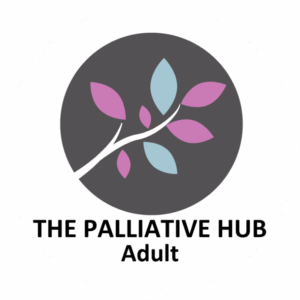
Home » Palliative Care Journey » Care
Care
Palliative Care involves everyone in the family and can leave a family with numerous questions that often do not have straight or simple answers. Depending on the illness, a person’s age and their life expectancy, the options and decisions to be made by a person and their family can vary hugely. This section of the website seeks to offer people and their family’s advice about care decisions. It provides basic definitions on the different forms of care a person may receive and provides links to organisations that will be able help a family with caring for a loved one.
Click here to view our Helpful Resources page related to Care
Palliative care is an interdisciplinary approach that improves quality of life for people with a life-limiting illness and those important to them through a focus on expert pain and symptom management, improved communication and goals-of-care discussions, and the provision of psychosocial, spiritual and bereavement support (National Adult Palliative Care Policy, 2024). Palliative care aims to improve the quality of life of the person with the life-limiting illness and those important to them. Palliative care is often provided by a team of health and social care professionals including doctors, nurses, social workers, chaplains, physiotherapists, occupational therapists, dieticians, speech and language therapists and pharmacists. This section of the website seeks to offer people and those important to them advice about care decisions. It provides basic definitions on the different forms of care a person may receive and provides links to organisations that will be able help when caring for a loved one with a life-limiting illness.
Palliative care is tailored to a person’s individual needs and can be provided in different settings depending on the person’s circumstances and preferences. Focusing on holistic care, palliative care can help:
- Pain and symptom management: It can help to control pain and manage symptoms like nausea, fatigue and shortness of breath, allowing people to feel more comfortable.
- Emotional and psychological support: Palliative care teams can offer counselling and emotional support to people and those important to them, helping them to cope with the psychological and emotional aspects of living with a serious illness
- Improved quality of life: By focusing on comfort and symptom management, palliative care can help individuals love their remaining time more fully with dignity and less distress
- Support for those important to you: People important to you also receive support, including practical help and counselling to assist them in caring for a loved one and coping with emotional challenges.
- End of life planning and decisions: Palliative care teams assist in advance care planning, helping people and those important to them make informed decisions about care options and end of life choices.
- Holistic care: Care is personalised, respecting the persons wishes, values and beliefs. It can be provided in various settings including home, nursing and care homes, hospices and hospitals.
The aim is always to provide compassionate and supportive care to the person with the life-limiting illness and those important to them.
Historically palliative care was often misunderstood as end-of-life care, leading to negative or fearful associations. There is a growing effort to reframe how people think about palliative care, highlighting its broader benefits and importance in improving the quality of life for people with serious, chronic and life-limiting illness. Palliative and end-of-life care are closely related but there are distinct differences in their focus, timing and approach.
Palliative Care
Palliative care is a holistic approach that aims to improve the quality of life for people with serious or life-limiting illnesses. It focusses on managing symptoms (such as pain, fatigue, nausea, and breathlessness) and addressing the emotional, psychological, social and spiritual needs of the person. Palliative care can be provided at any stage of a serious illness, whether the illness is curable, chronic or progressive. It can also be given alongside curative treatments and continues through the course of illness as the person’s needs evolve. The goal is to enhance a person’s quality of life, relieve suffering and help people live as well as possible regardless of their prognosis. It also aims to support people important to the person diagnosed with a serious or life-limiting illness. Palliative care can be provided in various setting and can be delivered by health and social care professionals.
End-of-Life Care
End-of-life care is an important part of palliative care specifically focussed on the final stages of life when death is imminent. The care is focussed on comfort, dignity, and ensuring that the person’s remaining time is as peaceful as possible. This also includes bereavement support for those important to the person after death. End-of-life care is usually provided when a person is expected to live for a few weeks or months at most. It becomes more relevant when a person is approaching the last stages of a life-limiting illness and curative treatments are no longer appropriate. The primary goal is to ensure a person’s comfort and dignity as they approach death. Symptom management is key, with an emphasis on alleviating pain, breathlessness, or other distressing symptoms, and providing emotional and spiritual support to the person and those important to them. End-of-life care can be provided at home, in hospitals, in care facilities and in hospices depending on the persons preferences, needs and the availability of care services.
Health and social care professionals providing you and your family with palliative care are there to help alleviate the symptoms you may experience as a result of your illness. However, they are not only there to focus on providing medication, they can also provide support and advice to help with your fears and concerns and answer your questions. The goal of palliative care is the achievement of the best quality of life for you and those important to you.
It is important that you express your wishes regarding where you would like this care to take place and have discussions about your preferred place of care with your family, and the health and social care professionals involved in your care. This will promote shared decision making and ensure those important to you are aware of your wishes.
Seeing a person important to you going through the stages of a life-limiting illness can be tough, especially if you are a carer. Health and social care professionals are there to provide carers with support and advice to help guide them through their journey as a carer through to bereavement.
Click the links below to watch personal videos of people:
View more information on Forms of Care:
- Hospital Care
- Hospice Care
- Palliative Rehabilitation
- Breathlessness Support
- Planning Ahead
- Self Care
- Community Care
- Spirituality



